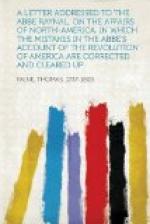The following is the answer of Congress to the second application of the Commissioners.
SIR,
York-Town, June 6, 1778.
“I HAVE had the honour of laying your letter of the 3d instant, with the acts of the British Parliament which came inclosed, before Congress; and I am instructed to acquaint you, Sir, that they have already expressed their sentiments upon bills, not essentially different from those acts, in a publication of the 22d of April last.
“Be assured, Sir, when the King of Great Britain shall be seriously disposed to put an end to the unprovoked and cruel war waged against these United States, Congress will readily attend to such terms of peace, as may consist with the honour of independent nations, the interest of their constituents, and the sacred regard they mean to pay to treaties. I have the honour to be, Sir,
Your most obedient, and most humble servant, HENRY LAURENS, President of Congress.”
His Excellency,
Sir Henry Clinton, K.B., Philad.
Though I am not surprised to see the Abbe mistaken in matters of history, acted at so great a distance from his sphere of immediate observation, yet I am more than surprised to find him wrong, (or at least what appears so to me) in the well-enlightened field of philosophical reflection. Here the materials are his own; created by himself; and the error, therefore, is an act of the mind. Hitherto my remarks have been confined to circumstances: the order in which they arose, and the events they produced. In these, my information being better than the Abbe’s, my task was easy. How I may succeed in controverting matters of sentiment and opinion, with one whom years, experience, and long established reputation have placed in a superior line, I am less confident in; but as they fall within the scope of my observations, it would be improper to pass them over.
From this part of the Abbe’s work to the latter end, I find several expressions which appear to me to start, with a cynical complexion, from the path of liberal thinking, or at least they are so involved as to lose many of the beauties which distinguish other parts of the performance.
The Abbe having brought his work to the period when the treaty of alliance between France and the United States commenced, proceeds to make some remarks thereon.
“In short,” says he, “philosophy, whose first sentiment is the desire to see all governments just, and all people happy, in casting her eyes upon this alliance of a monarchy, with a people who are defending their liberty, is curious to know its motive. She sees at once too clearly, that the happiness of mankind has no part in it.”
Whatever train of thinking or of temper the Abbe might be in, when he penned this expression, matters not. They will neither qualify the sentiment, nor add to its defect. If right, it needs no apology; if wrong, it merits no excuse. It is sent to the world as an opinion of philosophy, and may be examined without regard to the author.




